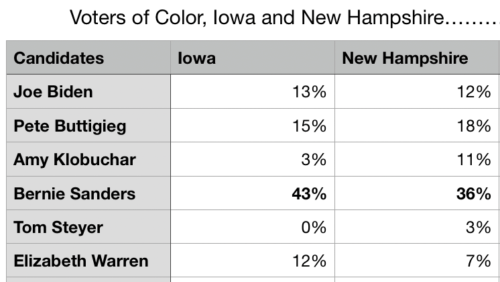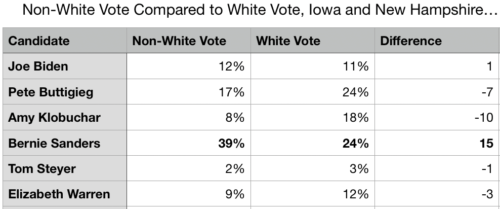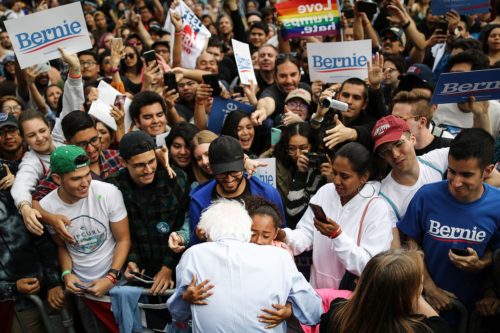Iowa and New Hampshire have voted already, and Nevada’s coming up! With a large field and more attention to diversity in the Democratic Party, we’ve heard a lot of talk about who people of color support. Some people – notably Julián Castro – point out the whiteness of the early states.
Castro’s right, but Iowa and New Hampshire aren’t 100% white. There are lots of people of color in each state, and they voted. Who did people of color vote for in Iowa and New Hampshire? And do those numbers predict how people of color will vote in other states?
People of Color in Iowa and New Hampshire
Early polling showed Joe Biden and Bernie Sanders in the lead among all voters, but especially among people of color. Did Iowa and New Hampshire match that pattern?
Sort of, but not exactly. Here’s how people of color voted in Iowa and New Hampshire, according to exit polls.

The short answer? Bernie Sanders did very, very well. He easily won in both states, but especially Iowa. Biden and Buttigieg did…OK. Everyone else has serious work to do.
Comparative Voting Between People of Color and White Voters
It’s also worth looking at how each major candidate did among voters of color compared to white voters. Given that some candidates pointed to the whiteness of Iowa and New Hampshire, we might see very different results in less white states.
Did any of the candidates do well among voters of color, but poorly among white voters? If so, those candidates might do much better in the less white states coming up in late February and March.
Let’s take a look at the data. But first, here’s how I calculated the table below: I used the same CNN exit polling. But I combined the data from the two states. Since Iowa composed 37% of total turnout between the two states and New Hampshire 63% of total turnout, I weighted the numbers accordingly. The weighting didn’t change results much, but it did provide a bit of a boost to Amy Klobuchar and a bit of a downward pull on Bernie Sanders.

The comparative data make it clear just how well Sanders did. These data strongly support the Sanders campaign’s theory of its electorate as composed of young people, independents, leftists, and working class people of color. In fact, Sanders won the popular vote in Iowa – and probably New Hampshire, too – on the strength of his support among people of color.
Other Candidates
As it turns out, Sanders is the only candidate who did much better among voters of color than among white voters. And several candidates – notably Pete Buttigieg and Amy Klobuchar – did much better among white voters than among voters of color. Tentatively, it’s hard to see these candidates doing better as the primaries move on to less white states.
And finally, several candidates – notably Joe Biden and Elizabeth Warren – openly claim they’ll do better among the non-white voters in upcoming states. While that’s perhaps possible for Biden – as I’ll discuss below – Warren doesn’t look to have much of a case. Iowa and New Hampshire were much better fits for her than Nevada and South Carolina. That’s why I thought she had to win one of the first two states. Now she’ll likely continue to struggle.
What About Upcoming States?
Nevada and South Carolina are up next, and then the candidates move on to Super Tuesday on March 3. Should we expect these results to continue? Will Sanders continue trouncing other candidates among people of color?
Maybe, though I doubt he’ll continue winning by margins this large. Voters of color in South Carolina and across the South tend to be older and more moderate. Furthermore, Sanders does better among Latinx voters than among black voters, and there are far more black voters than Latinx voters in the South. And so, I expect South Carolina to be a more challenging electoral environment for him. Nevada, on the other hand, looks very promising.
Other candidates have some difficulties. Thus far, Biden is doing much worse than expected. And while South Carolina presents him with opportunities, Nevada looks challenging for him. Given his overall difficulties, he needs to do much better. A win in South Carolina alone won’t do it for him.
